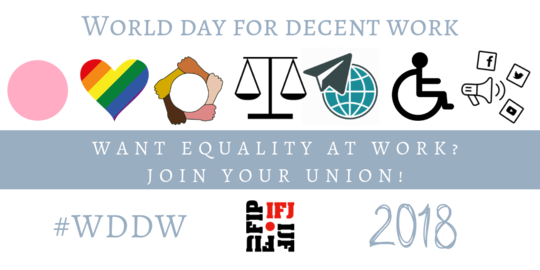Our Unions at Work: NUJ on Gender Pay Gap
When BBC China Editor, Carrie Gracie, resigned in January 2018 accusing the corporation of “breaking equality law”, she set off a chain of events which has seen the journalists union, NUJ, help to win equal pay for dozens of other women.
Carrie was offered a 33% pay-rise.. The problem is, she discovered she was already paid nearly 50% less than her equivalent male counterparts in the corporation. The NUJ, an IFJ affiliate representing 38,000 journalists in the UK and Ireland, supported Gracie in her fight and helped extend the protest to the whole BBC female staff.
“The NUJ is determined to hold the BBC to account and reach proper settlements on behalf of women who have suffered a deficit in salary and pension contributions over many years,” stated Michelle Stanistreet, NUJ general secretary at the time.
In Vanguard of Defense
Even before carrie’s resignation the NUJ had run an independent survey and published the results in November 2017, highlighting that eight out of ten women at the BBC believed they were paid less than their male counterparts.
By publishing the results, the union forced the issue in to the public spotlight. The NUJ’s partner unions and organizations, including the IFJ, all voiced their full support.
The union then lodged more than 180 equal pay cases on behalf of its members, including Carrie Gracie.
Every single case submitted “inspired many other cases, and successful settlements, at workplaces elsewhere in the industry”, said the NUJ.
Larger Actions Against Larger Problem
By April 2018, it was clear that the problem was of a much larger scale than just within the UK’s biggest public broadcasting company.
The Equality and Human Rights Commission’s gender pay reporting service revealed rampant inequalities in pay across the UK, with disturbing problems exposed in media companies in particular, including The Telegraph, Conde Nast, News UK, the Economist and many other major media companies.
In response to the disclosure of this data, the NUJ launched a union-wide campaign on improving working conditions for women workers in the UK media industry. The campaign included the launch of an NUJ Women Network, securing greater transparency of reporting on equal pay in media organizations and greater monitoring of the issue across the media industry, as well as helping to share experiences to create best practice models designed to combat discrimination in media workplaces.
Developing a strong position and as a collective voice for women workers the NUJ made progress on improving working conditions for women journalists. Tentative negotiations with the employers “led to a significant spike in the number of equal pay cases across a range of workplaces and sectors,” according to a report to the NUJ Delegate Meeting..
Apart from pay issues, the negotiations also struck agreements on “family-friendly policies, flexible working hours and a commitment from employers to more part-time working and job sharing, particularly for senior positions that are too often dominated by men”.
Today: “Progress has been made, but clearly further action is needed”
Now, over six months since Carrie Gracie published her open letter resigning, the progress made by the NUJ is evident.
In its response to the BBC 2018 annual report, the NUJ announced progress on closing the gender pay gap at BBC. The median gap dropping to 7.6 per cent from 9.3 per cent, and the NUJ is optimistic that the closing of the gap by 2020 “is possible if the BBC follows through on the range of recommendations and commitments it has made following the recent reviews”.
It also stated that “significant changes and pay adjustments have taken place in recent months – including increases for women and some pay cuts for senior individuals earning way above new salary thresholds”.
The male to female split in the BBC’s highest earning presenters in 2018/19 will be 60:40, rather than last year’s 75:25.
The BBC and Carrie Gracie reached an agreement to address her issues in June. The BBC acknowledges that Carrie was told she would be paid in line with the North America Editor when she took the role of China Editor, and she accepted the role on that understanding.
Carrie will donate all the backdated pay from the BBC to help women striving for equality at work.
While working condition improve for women at the BBC, the problem still remains widespread across the UK media industry. The NUJ continues to fight, campaign, lobby and win to improve pay and conditions for all journalists, men and women alike.
“Join a union. This is the first thing women who work in firms with a large pay gap should do,” Diana Holland, assistant general secretary at Unite, NUJ’s sister union, advises. “The gender pay gap in trade union organized workplaces is smaller than in those where there is no union. Join a union whether or not your employer recognizes one”.As the NUJ has proved:
For fairness at work and equal pay a woman’s place is in her union!

